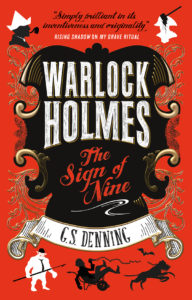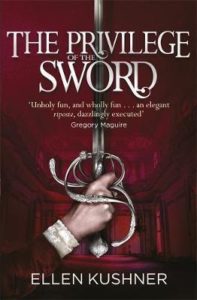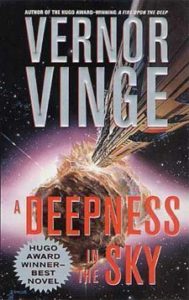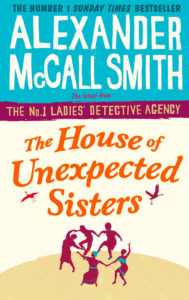 Q. I’ve never done a follow-up interview before! I’d like first to thank you for the delightful first interview we conducted. What new and delightful things have you encountered since last we spoke that you’d like to share with our readers?
Q. I’ve never done a follow-up interview before! I’d like first to thank you for the delightful first interview we conducted. What new and delightful things have you encountered since last we spoke that you’d like to share with our readers?
A. I’ve never done a follow-up interview, either. First! Double-first! Let’s do this.
Well, since we last spoke, Warlock Holmes has moved into its dark middle chapter. Book 4 and 5 are sort of the “Empire” section. I’m spending two years making all my characters and the readers who care for them suffer! Bwaaa-ha-ha!
Q. Irene has definitely been my favorite female character in your books so far, a view that has only been encouraged by the depiction of the dire Mary Morstan in The Sign Of Nine. Can I look forward to an eventual showdown between Irene and Mary in the final book in the series?
AI thought about that. I thought about having Mary present in all the following books (and this series might go to 8 or 9, if I get to parody all 60 Holmes stories). But there’s one big thing in the way of that: she dissapears from the original stories. Suddenly, she’s just… gone. I could write her in, but I’m already trying to get Adler and Moriarty bigger roles and I’m in danger of not being a very effective parody if I stray too far from the originals. I’ve got a fine balance to maintain, here. Now—without engaging in too many spoilers—there is a showdown planned for Mary. But I won’t promise it’s necessarily with Irene. All I’ll say is that my Mary is not just going to fade away. My readers will know exactly what happens with my Mary Morstan. Oh, yes they will… *rubs hands and cackles in a dark corner*
Q. While romance has always been a significant interest of Watson’s, much to the bewilderment of Holmes, it’s really the friendship between the two men that is the sustaining relationship of any fiction about them. What are your thoughts on the importance of friendship vs romance?
A. I have always thought people put too much distance between the two. The best romances are not usually the people who are just hot for each others’ pants. They occur between people who have a fundamental connection to which attraction can be added. Friendship is a great basis for this. In the case of Watson and Irene, it’s respect. Watson is fascinated with her because she’s smarter than him. She keeps besting him. So, of course, he can’t think about anyone else. By the end of book 5 (which I know is a long way away for you guys, sorry) I’ve made it pretty clear why she likes him. Because he’s a good man. Like Han Solo, he always says he’s playing it safe and looking out for himself, but he never does. He puts his wellbeing and safety aside to help others all the time. He even tries to help Irene (though she doesn’t need it). After all the shallow, awful men she’s accustomed to, she can’t help but admire how good he is. She knows Holmes is good. She knows Watson is good. They respect each other for it. She respects them. They keep calling her a murderer and a liar—which she knows she is—and she just has this frustration that she’s not allowed into their “good-person” club.
Q. You’ve been a big proponent of geek culture becoming mainstream. With two of the biggest geek properties in popular media, the Avengers and Game Of Thrones, recently winding down their effective main stories, what other stories do you think will come to the forefront, Sherlock and Lovecraft aside?
A. Honestly, I think there’s going to be a bit of a vaccum for a while. And yes, I know there’s never been so much geek-friendly entertainment. I know there’s never been such a focus on writing in television. But still, I have this fear that everyone is going to rush to try to fill that void. And the things they’re going to throw in are going to be like… well… like Penny Dreadful—based on a flavor that they know we geeks will like; filled with a lot of cool ideas and cool visuals; but definitely not the finished, polished, complete packages that are prepared to fill the shoes that have just been vacated.
That said: hey, Netflix, call me! You want to start doing movies, eh? How about movies, supported by streamed episodes of the same IP? Because there were 4 Holmes novels and 56 short stories. That’s 4 longer movies and 56 smaller episodes of Warlock Holmes that I’ll let you have for little more than the promise you’ll do them well.
And that’s the big thing for whatever geek-dynasty is going to supplant the MCU and GoT: you need to do that stuff really well. Even GoT faltered at the end. Star Wars has blown up the Death Star 3 bloody times! Don’t try to fool us. Be bold! Craft something marvelous!
Q. Speaking of Lovecraft, I know you’ve been very interested in seeing what other authors do with the setting now that it’s public domain. Do you have any recommendations of such that you’ve enjoyed so far? And do you think you’ll ever turn your hand to it yourself?
A. Well, in a sense, I am. There has always been an idea in Warlock Holmes that magic is dark and bad. That gods are not what we expect. That the idea of the human soul or immortality is laughable. And that outside our comfortable little reality are horrible, evil beings that would crush us utterly if they ever got in here. I owe most of my paycheck to Arthur Conan Doyle, sure, but Lovecraft should get a cut, too.
I think if I ever tried Lovecraft more directly, my take would be this: my protagonist is basically Cthulhu. He sees the humans and all they’ve built and he’s fascinated. He wants to experience it all. He wants to fanboy over all of it. He wants to be loved and included and have what people have: good friends with whom to enjoy all the marvels humans have created. Unfortunately, he’s 200 feet tall and destroys all he touches. And his only friends are the kind of humans who are glad he does. Poor fella.
As far as what I’ve seen that’s fun like that… hm… I see so little now that I spend 40 hours a week at my day-job, 25 hours a week on Holmes, and still try to have time for my wife and two young girls. Hell, I don’t even sleep that much. Oh! Here’s one! Go back and check out the much-ignored Todd and the Book of Pure Evil. Basically, it’s like dirtier, funnier, Canadian Buffy the Vampire Slayer.
Q. In our last interview, we talked about your very intriguing YA novel, a sort of Romeo and Juliet with intrepid adventurers on one side and mad scientists on the other. Will we be able to look forward to reading that in print in the near future?
A. The project isn’t dead, really, but it is delayed. Honestly, Wonder-Woman, Squirel-Girl and Black Panther have done a lot of what it was trying to do: say welcome to a more diverse range of comic-book lovers. And since my writing hours are limited, Titan Books and my agent want to see that spent on Warlock. And they’re right. I have this cold, creeping dread of being time-crunched into putting out a bad book. Bad books last forever. My grandkids will be judging me on that. Marketing is wise. Sleeping is wise. But most importantly, I’ve got to spend my time making sure I’ve got a worthy book 5.
Q. What other projects are you working on with the Warlock Holmes series winding down?
A. Well… It isn’t. Titan has only purchased 5 books—and that’s normal. They’ve got to make sure I keep bringing in enough dough to support more, before they commit to making anything unprofitable. But I know it would take me 8 to 9 books to finish the series off. And… I don’t know… I’m so married to this series now that I think I’d finish it, even if Titan gave me the boot. I hate leaving stories unfinished, and I know how to finish this one.
Q. The Graphic Audio version of your books so far is so much fun, and I’m not ordinarily a fan of audiobooks myself. Are there any other media adaptations of Warlock Holmes forthcoming?
A. Yeah. I love those guys. And they just keep getting better. I enjoyed their version of my first and second books, but by book 3… well, let me just say: I’ll probably never read my own third book again. I’ll just listen to those guys’ radio-play version. They’ve agreed to do The Sign of Nine and I’m so happy!
No other adaptations on the horizon. We have had 3 film nibbles and a rumor that the Veep writers were adapting Warlock, but nothing with any teeth, so far. Don’t give up, though. I haven’t.
Q. On the subject of media adaptation, what would be your dream casting of a Warlock Holmes movie?
A. Right now I’m on a kick where I’d like to see it color-swapped or gender swapped. I’ve wanted to be more of an ally for geekdom as an opt-in culture. Unfortunately, the first project I’ve gotten into the public eye is very old, very white male-centric. But, come on, try and tell me that Key and Peele would make a fantastic Holmes/Watson duo. You know who else would make a charming Watson? Masie Williams. And I hear she just came available. I totally want to see Masie looking put-upon in a fake moustache, don’t you?
Q. You and I both love this series, but go ahead and tell the readers why you love this latest installment, The Sign Of Nine!
A. I think the real strength of Sign of Nine is in Watson’s drug-dream scenes. Don’t get me wrong, the fact that I go almost 20 pages without a joke in one of them gave me cold, hard terror-sweats. But they’re worth it. They give insight to the villains and the larger world of the story which—assuming my readers have been along for this whole ride—it was rather time for. I didn’t want this to come as a total addendum, absolutely outside the frame of the story. So, I made sure that even if the dreams themselves were extraneous, the price Watson paid to get them was central to the arch of the book. And—without spoiling too much—that price sets up book 5.
~~~
Author Links:
g s denning
~~~
The Sign Of Nine was published May 21st 2019 and is available via all good book sellers. My review of the book itself may be found here.








